外企上班族常用英语对话十句
外企人员实用日常英语会话
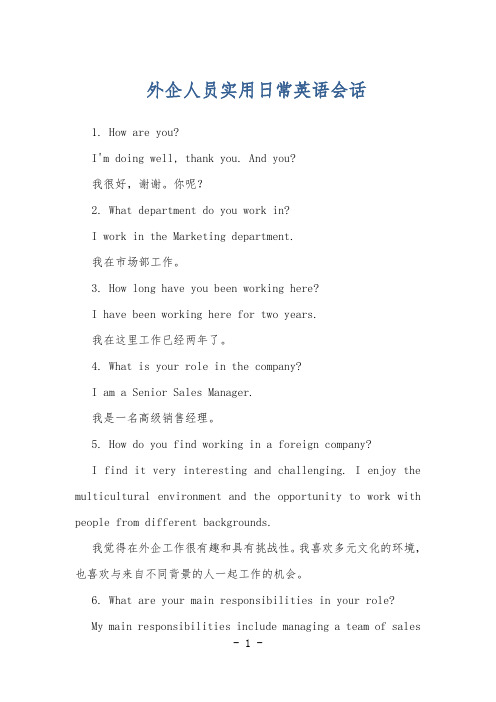
外企人员实用日常英语会话1. How are you?I'm doing well, thank you. And you?我很好,谢谢。
你呢?2. What department do you work in?I work in the Marketing department.我在市场部工作。
3. How long have you been working here?I have been working here for two years.我在这里工作已经两年了。
4. What is your role in the company?I am a Senior Sales Manager.我是一名高级销售经理。
5. How do you find working in a foreign company?I find it very interesting and challenging. I enjoy the multicultural environment and the opportunity to work with people from different backgrounds.我觉得在外企工作很有趣和具有挑战性。
我喜欢多元文化的环境,也喜欢与来自不同背景的人一起工作的机会。
6. What are your main responsibilities in your role?My main responsibilities include managing a team of salesrepresentatives, developing sales strategies, and achieving sales targets.我的主要职责包括管理销售代表团队,制定销售策略,以及实现销售目标。
7. How do you communicate with your team members?I communicate with my team members through regular team meetings, emails, and one-on-one discussions. We also use project management tools to collaborate and stay updated on our progress.我通过定期的团队会议、电子邮件和一对一的讨论与团队成员沟通。
外企办公室常用经典英文
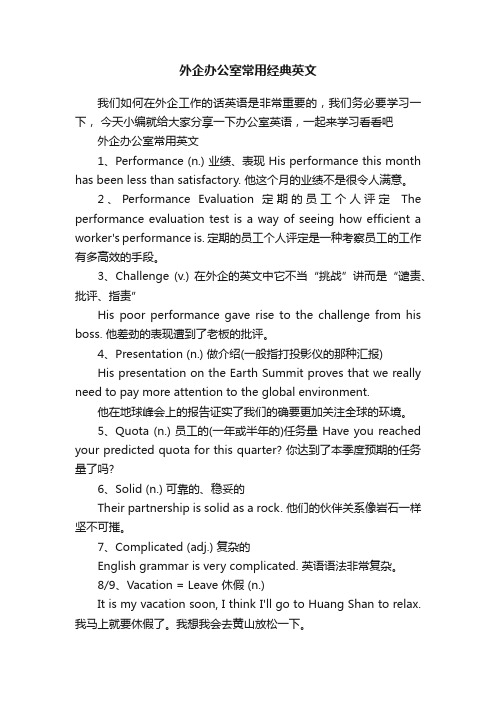
外企办公室常用经典英文我们如何在外企工作的话英语是非常重要的,我们务必要学习一下,今天小编就给大家分享一下办公室英语,一起来学习看看吧外企办公室常用英文1、Performance (n.) 业绩、表现 His performance this month has been less than satisfactory. 他这个月的业绩不是很令人满意。
2、Performance Evaluation 定期的员工个人评定The performance evaluation test is a way of seeing how efficient a worker's performance is. 定期的员工个人评定是一种考察员工的工作有多高效的手段。
3、Challenge (v.) 在外企的英文中它不当“挑战”讲而是“谴责、批评、指责”His poor performance gave rise to the challenge from his boss. 他差劲的表现遭到了老板的批评。
4、Presentation (n.) 做介绍(一般指打投影仪的那种汇报)His presentation on the Earth Summit proves that we really need to pay more attention to the global environment.他在地球峰会上的报告证实了我们的确要更加关注全球的环境。
5、Quota (n.) 员工的(一年或半年的)任务量 Have you reached your predicted quota for this quarter? 你达到了本季度预期的任务量了吗?6、Solid (n.) 可靠的、稳妥的Their partnership is solid as a rock. 他们的伙伴关系像岩石一样坚不可摧。
7、Complicated (adj.) 复杂的English grammar is very complicated. 英语语法非常复杂。
外企实用口语
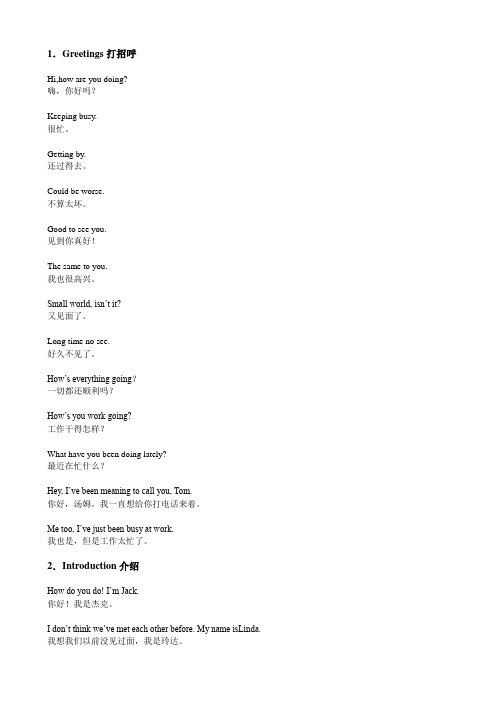
1.Greetings打招呼Hi,how are you doing?嗨,你好吗?Keeping busy.很忙。
Getting by.还过得去。
Could be worse.不算太坏。
Good to see you.见到你真好!The same to you.我也很高兴。
Small world, isn’t it?又见面了。
Long time no see.好久不见了。
How’s everything going?一切都还顺利吗?How’s you work going?工作干得怎样?What have you been doing lately?最近在忙什么?Hey, I’ve been meaning to call you, Tom.你好,汤姆。
我一直想给你打电话来着。
Me too, I’ve just been busy at work.我也是,但是工作太忙了。
2.Introduction介绍How do you do! I’m Jack.你好!我是杰克。
I don’t think we’ve met each other before. My name isLinda.I work for IT Company.我在IT公司工作。
I’m here to meet you on behalf of our company.我代表我们公司前来欢迎你们。
She’s a personal assistant to the general manager.她是总经理的私人助理。
May I introduceMr Wang to you?我可以为你介绍王先生吗?I wonder if you would introduce me toMiss Li?你能把我介绍给李小姐吗?May I have your name?请问尊姓大名?MrLiu, I suppose?您就是刘先生吗?Please call me Mark.叫我马克就行。
外资公司最实用口语英语100句
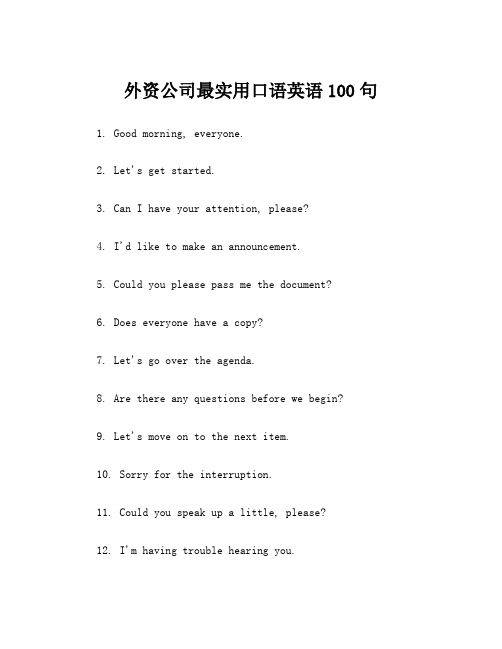
外资公司最实用口语英语100句1. Good morning, everyone.2. Let's get started.3. Can I have your attention, please?4. I'd like to make an announcement.5. Could you please pass me the document?6. Does everyone have a copy?7. Let's go over the agenda.8. Are there any questions before we begin?9. Let's move on to the next item.10. Sorry for the interruption.11. Could you speak up a little, please?12. I'm having trouble hearing you.13. Can we table that discussion for now?14. Let's circle back to that later.15. I'm not sure I understand. Could you clarify?16. Let's break for lunch.17. Shall we reconvene at 2 p.m.?18. Thanks for your input.19. I appreciate your insights.20. Let's aim to finish by 4 p.m.21. Does anyone need a break?22. I need to step out for a moment.23. Could you fill me in on the details?24. Let's keep the conversation focused.25. I'll take that into consideration.26. Can we wrap this up soon?27. Let's make a decision by the end of the day.28. I'll follow up with an email.29. Could you take the lead on this project?30. We need to meet the deadline.31. Let's brainstorm some ideas.32. I'm open to suggestions.33. Can you provide some examples?34. Let's explore alternative options.35. It's important to think outside the box.36. We need to cut costs.37. Let's streamline our processes.38. Can we improve efficiency?39. I'll take care of the paperwork.40. Let's arrange a meeting with the client.41. I'll handle the negotiations.42. Can you prepare a presentation for next week?43. Let's schedule a conference call.44. I'll book the conference room.45. We need to finalize the budget.46. Let's allocate resources wisely.47. Can we increase our market share?48. Let's analyze the competition.49. I'll conduct a market research.50. Can you provide a progress report?51. Let's stay on track.52. I'll take the lead on this initiative.53. Can we delegate tasks more effectively?54. Let's set realistic goals.55. I'll monitor the progress closely.56. Can we address any issues as they arise?57. Let's stay flexible and adapt to changes.58. I'll keep everyone informed.59. Can we mitigate any potential risks?60. Let's prioritize our objectives.61. I'll coordinate with other departments.62. Can we collaborate more efficiently?63. Let's foster a positive work environment.64. I'll provide support as needed.65. Can we recognize employees' efforts?66. Let's celebrate our achievements.67. I'll organize a team-building activity.68. Can we promote a culture of innovation?69. Let's encourage feedback from employees.70. I'll implement new strategies.71. Can we enhance our company's reputation?72. Let's strengthen our brand image.73. I'll oversee the marketing campaign.74. Can we expand our customer base?75. Let's improve customer satisfaction.76. I'll address any customer complaints.77. Can we increase sales revenue?78. Let's explore new markets.79. I'll negotiate contracts with suppliers.80. Can we reduce production costs?81. Let's invest in technology upgrades.82. I'll analyze financial reports.83. Can we improve cash flow?84. Let's diversify our investments.85. I'll consult with financial advisors.86. Can we minimize tax liabilities?87. Let's ensure compliance with regulations.88. I'll review legal documents.89. Can we avoid potential legal disputes?90. Let's prioritize employee safety.91. I'll conduct safety training sessions.92. Can we reduce environmental impact?93. Let's implement sustainable practices.94. I'll monitor energy consumption.95. Can we support community initiatives?96. Let's engage in corporate social responsibility.97. I'll organize volunteer events.98. Can we contribute to local charities?99. Let's build positive relationships with stakeholders. 100. I'll strive for continuous improvement.。
外企工作英语口语
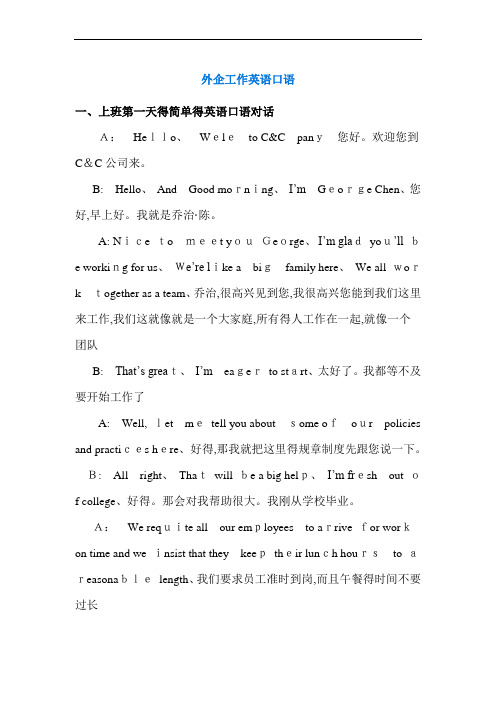
外企工作英语口语一、上班第一天得简单得英语口语对话A:Hello、Weleto C&C pany您好。
欢迎您到C&C公司来。
B:Hello、And Good morning、I’m George Chen、您好,早上好。
我就是乔治·陈。
A: Nice tomeet youGeorge、I’m gladyou’ll be working for us、We’re like a bigfamily here、We all worktogether as a team、乔治,很高兴见到您,我很高兴您能到我们这里来工作,我们这就像就是一个大家庭,所有得人工作在一起,就像一个团队B:That’s great、I’m eagerto start、太好了。
我都等不及要开始工作了A:Well, let metell you aboutsome ofour policies and practices here、好得,那我就把这里得规章制度先跟您说一下。
B:All right、Thatwill be a big help、I’m fresh out of college、好得。
那会对我帮助很大。
我刚从学校毕业。
A:We requite all our employees to arrive for workon time and we insist that they keeptheir lunch hoursto areasonablelength、我们要求员工准时到岗,而且午餐得时间不要过长B: Iunderstand、Thatseems easytofollow、我明白,这很容易做到。
A:Employee character is very important tous、We expect everyone here atC&C to beindustrious, coope rative,honest and open-minded、员工性格很重要。
在外企混必用的英语口语
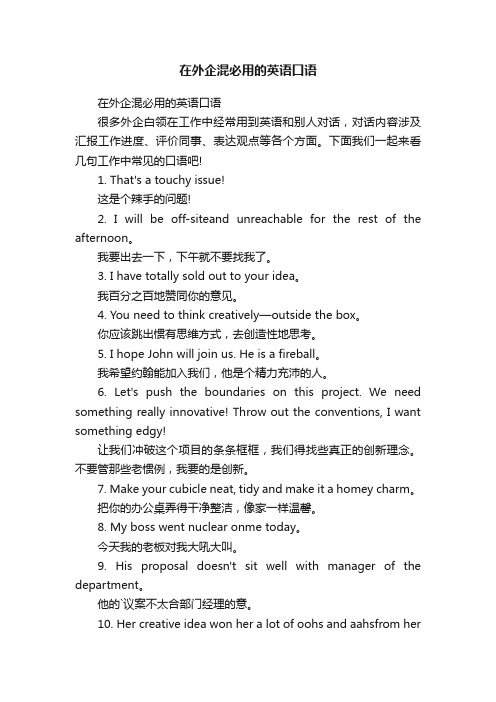
在外企混必用的英语口语在外企混必用的英语口语很多外企白领在工作中经常用到英语和别人对话,对话内容涉及汇报工作进度、评价同事、表达观点等各个方面。
下面我们一起来看几句工作中常见的口语吧!1. That's a touchy issue!这是个辣手的问题!2. I will be off-siteand unreachable for the rest of the afternoon。
我要出去一下,下午就不要找我了。
3. I have totally sold out to your idea。
我百分之百地赞同你的意见。
4. You need to think creatively—outside the box。
你应该跳出惯有思维方式,去创造性地思考。
5. I hope John will join us. He is a fireball。
我希望约翰能加入我们,他是个精力充沛的人。
6. Let's push the boundaries on this project. We need something really innovative! Throw out the conventions, I want something edgy!让我们冲破这个项目的条条框框,我们得找些真正的创新理念。
不要管那些老惯例,我要的是创新。
7. Make your cubicle neat, tidy and make it a homey charm。
把你的办公桌弄得干净整洁,像家一样温馨。
8. My boss went nuclear onme today。
今天我的老板对我大吼大叫。
9. His proposal doesn't sit well with manager of the department。
他的`议案不太合部门经理的意。
10. Her creative idea won her a lot of oohs and aahsfrom herco-workers。
外企办公室常用的英语口语
外企办公室常用的英语口语我们的外企工作人员常常在办公室听到的英语口语有哪些呢?接下来,小编给大家准备了外企办公室常用的英语口语,欢迎大家参考与借鉴。
外企办公室常用的英语口语1. ABC corporation. May I help you? ABC 公司,我能帮你什么吗?这句话算是制式的讲法。
一般接起电话的人通常会先报公司的名字 "ABC corporation", 然后再说, "May I help you?" 或是如果要更客气一点的话则可以说 "How can I help you?" (我该怎么帮你?), 因为这样的问法表示我‘该’怎么帮你, 而非我‘需不需要’帮你? 但基本上"May I help you?" 跟 "How can I help you?" 都很常见就是了.不过如果是机器接的电话, 则听到的多半是这样, "Thanks for calling ABC corporation, if you know your party's last name or extention, press 1. If you want to recieve information or publication, press 2. If you want to talk to the operator, press pound sign or remain on the line." (感谢你打电话到 ABC 来, 如果你知道你要找的人的姓或是分机号码, 请按1, 如果是想要本公司的简介或出版品, 请按2, 如果是要找总机, 请按#, 或是请别挂断.2. And you are? 你是?如果人家打电话来是要找你的上司, "May I talk to your manager?" (我能不能跟你们经理讲话?) 这时你总不能糊里糊涂地就把电话拿给经理说, 说不定人家是打电话来跟你经理勒索一百万的呢! 所以通常我们一定要先确定打电话来的是谁. 最客气的问法是, "Whom I am speaking with?" 或是 "Whom am I talking to?" (我正在跟谁讲话呢?) 但是人家一听是像我这种小毛头打电话找他们经理, 他们就会用比较口语的说法, "And you are?" (你是?) 如果人家这样问我, 我就可以答, "This is Benlin."像是 "And you are?" 这么口语的英文书上大概学不到, 但这却是老美天天在用的句子, 只怕你学了之后还不敢用. 其实真的不用怕. 越简单的句子老美越听得懂. 而且事实上 "And you are?" 这句话还有许多适用的场合, 例如在公司的接待处 (reception). 来访的客人如果说, "I'm looking for Mr. Wolf." (我要找伍夫先生) 接待小姐就可以反问他, "And you are?" (你是?) 所以像这种简单又好用的句子大家一定要记起来喔!3. I'll put her on the phone. Just a second. 我会请她听电话, 请等一下.Put someone on the phone 这个片语就是说请某人听电话. 例如你打电话找你女朋友, 结果女朋友的同事接了电话, 就开始跟你东扯西扯, 问你们昨天是不是吵架了啊? 什么时候要结婚啦, 这时如果你实在不想跟她讲了, 就可以说, "Could you please just put her on the phone?" (你能不能请她来听电话啊?) 反过来如果今天是你接到了电话, 结果要找的是别人, 你就可以说, "Ok. I'll put her on the phone. Just a second." (好, 我会请她听电话, 请稍等一下.)上面讲的 put someone on the phone, 指的多半是只有一只电话时, 但如果像公司里有许多分机, 则用‘转接’ transfer 或是 redirect. 会比较恰当. 例如同样的情况你可以说, "I'm transferring your call." 或是 "I'm redirecting your call." (我帮你转接到分机给她.) 如果是接线生转接的话, 他们有时就只简单地说, "One moment, please." 或是, "OK. I'll put you through."4. Would you mind holding for one minute? 你介不介意稍微等一分钟啊?在美国如果有机会打电话给客户服务 (Customer Service)部门, 如果没意外的话都会听到以下的电话录音, "All of our representitives are currently busy serving their customers. Your call will be answered in approximate 5 minutes" (我们所有的客服人员都在忙着服务他们的顾客, 请等五分钟后, 就会有人接听你的电话), 然后十分钟过去了, "Please continue to hold, your call is very important to us." (请继续等候, 你的来电对我们非常重要). 所以大家要知道, 老美基本上对这种无止境的等待是深恶痛绝的. 所以要记得, 如果人家打电话来, 千万不要因为听不懂就说, "Hold on", 然后就跑去求救兵, 这对打电话来的人是十分不礼貌的.如果万不得已一定要请他稍候, 我们要客气一点地说, "Would you mind holding for one minute?" 所以记得要给对方一个明确的时间, 例如 one second 或是 five minites 不要让对方无止境地等下去. 但是如果一分钟到了你还没忙完, 则最好再说一次, "Sorry, I am still on the phone. Could you hold for another minute?" (对不起, 我还在讲电话, 能不能再请你稍候一分钟.)5. He's out for lunch. Would you like to try again an hour later? 他出去吃午餐了, 你要不要一小时后再打来?受到中文的影响, 许多人要讲某人‘出去’吃午餐了常会说成, "He went out for lunch." 其实这个 went 是多余的, 通常老美只讲 be out for something 就行了. 如果要再简化一点, 单说, "He is on lunch." 或是 "He is on (lunch) break." (他正在休息时间.) 这样子也可以.如果别人要找的人不在, 通常我们有二种选择, 第一种是请别人晚点再打来, 除了像例句用 try again/ call again 之外, 我们也可以用 call back/ try back 这样的讲法. 例如你可以建议别人, "Why don't you call back in 30 minutes?" (你何不 30 分钟后再打来呢?) 第二种选择就是请对方留言, 客气一点的讲法是, "May I take your message?" 或是 "Would you like to leave a message?" (你想留言吗?)。
外企常用英语口语句型
在外企工作,流利的英语口语是非常重要的。
以下是一些常用的英语口语句型,适用于外企工作和商务交流:1. "Could you please provide more details?"(请提供更多详细信息。
)- 用于要求对方提供更多具体的信息。
2. "I'm afraid I don't quite understand. Could you clarify?"(恐怕我不太理解,能解释一下吗?)- 用于请求对方进一步解释或澄清。
3. "Let's schedule a meeting to discuss this in more detail."(我们安排个会议详细讨论一下。
)- 用于提议安排会议以深入讨论某个问题。
4. "I'll get back to you on that."(我会给你答复的。
)- 用于表示将回复对方关于某个问题的消息或决定。
5. "I appreciate your input."(感谢你的建议。
)- 用于表示对别人的意见或建议表示感谢。
6. "Let's explore alternative solutions."(我们来探讨一下其他解决方案。
)- 用于提议探讨其他可行的解决方案。
7. "We need to meet the deadline."(我们需要按时完成。
)- 用于强调工作需要在截止日期前完成。
8. "Could you give me a brief update on the project?"(能给我一个项目的简要进展情况吗?)- 用于请求对方对项目进行简要更新。
9. "I'll take that into consideration."(我会考虑的。
外企简单工作英语口语
外企简单工作英语口语一、上班第一天的简单的英语口语对话A: Hello. Welcome to C&C Company你好。
欢迎你到C&C公司来。
B:Hello. And Good morning. I’m George Chen.你好,早上好。
我是乔治·陈。
A:Nice to meet you George. I’m glad you’ll be working for us. We’re like a big family here. We all work togetheras a team.乔治,很高兴见到你,我很高兴你能到我们这里来工作,我们这就像是一个大家庭,所有的人工作在一起,就像一个团队B:That’s great. I’m eager to start.太好了。
我都等不及要开始工作了A: Well, let me tell you about some of our policies and practices here.好的,那我就把这里的规章制度先跟你说一下。
B: All right. That will be a big help. I’m fresh out of college.好的。
那会对我协助很大。
我刚从学校毕业。
A: We requite all our employees to arrive for work ontime and we insist that they keep their lunch hours to a reasonable length.我们要求员工准时到岗,而且午餐的时间不要过长B: I understand. That seems easy to follow.我明白,这很容易做到。
A: Employee character is very important to us. We expect everyone here at C&C to be industrious, cooperative, honest and open-minded.员工性格很重要。
外企办公室常用英语300句
11. Hello! / Hi! 你好!2. Good morning / afternoon / evening! 早晨(下午/晚上)好!3. I'm Kathy King. 我是凯西?金。
4. Are you Peter Smith? 你是彼得?史密斯吗?5. Yes, I am. / No, I'm not. 是,我是。
/ 不,我不是。
6. How are you? 你好吗?7. Fine, How are you? / Just so so. / Couldn’t be better. 很好,你好吗? /普通般/ 好得不能再好了。
8. I'm fine, too. 我也很好。
9. See you tomorrow/ later. 明天见/待会儿见。
10. I have to go now. 我必须走了。
11. Who are you? 你是谁?12. I'm Jim. 我是吉姆。
13. Who is the guy over there? 那边那个人是谁?14. He's Bob. 他是鲍勃。
15. What do you do? 你是做什么的?16. I'm a worker. 我是个工人。
17. She must be a manager, isn't? 她一定是个经理,不是吗?18. I really don't know./ I have no idea about it.我真不知道。
/我一点都不知道。
19. Yes, I think so. 是的,我认为是。
20. What's your name? 你叫什么名字?21. My name is Thomas. 我叫汤姆斯。
22. What's your family name? 你姓什么?123. My family name is Ayneswonth. 我姓安尼思华斯。
- 1、下载文档前请自行甄别文档内容的完整性,平台不提供额外的编辑、内容补充、找答案等附加服务。
- 2、"仅部分预览"的文档,不可在线预览部分如存在完整性等问题,可反馈申请退款(可完整预览的文档不适用该条件!)。
- 3、如文档侵犯您的权益,请联系客服反馈,我们会尽快为您处理(人工客服工作时间:9:00-18:30)。
外企上班族常用英语对话十句外企上班族常用英语对话十句(之一)1. In the middle of something?正在忙吗?我知道有许多许多的人, 对于某一种概念学会了一种说法之后, 从此就只会用这种说法. 例如‘你在忙吗?’这个句子, 很多人在国中起就知道要说, "Are you busy?" 讲到了来美国留学三年, 他还是只会说"Are you busy?". 其实有时候我们的眼界要放广一点, 对于同一个概念要有不同的变化. 就像是"Are you busy?" 这句话, 其实老美也很常用"In the middle of something?" , (但这句话比较接近于"Are you b usy right now?" 是问人家‘现在’是不是正在忙? "Are you b usy?" 的含意比较广, 也可指‘最近’忙不忙?) 大家不要小看这么小小的变化, 如果你除了"Are you busy?" 之外, 有时还懂得刻意去用"In the middle of something?" 我相信你的的英文说出来就会跟别人不一样. 举个例子吧, 办公室里想找人八卦, 又怕人家正在忙, 这时你就可以问他, "In the middle of something?" (正在忙吗?)记得在不久之前看过的一部黑人电影Down to Earth 中也有in the middle of something 这个用法, 只不过男主角是用这句话来提出一个论点, "The first kiss is always in themiddle of something." 也就是说, 初吻总是发生在讲话讲到一半时, 或是当你们正在作其它的事情时, 通常是果不其然的. 他同时也觉得, "The first kiss is the only real kiss in your relationship." (只有初吻才是真正的吻), "The others are just protocols" (其它的都只是一种敷衍、虚应故事而已.)2. What are you up to?你正在作什么?跟上面的例子一样, ‘你正在作什么啊?’这句话通常我们就只会说, "What are you doing?" 这样子不会很无聊吗? 其实有时我们可以换句话说. 例如: "What are you up to?" 同样也是问人家你正在作什么. 承上例, 假设你在办公室里, 你想找人八卦, 所以问同事, "In the middle of something?" 他回答, "Kind of." (算是吧.) 这时你就可以打破砂锅问到底, "What are you up to?" (那你最近在忙什么啊?) 另外有时候老美见面时也会问"What are you up to?" 意思就是问你最近在作什么啊? 跟另一句问候语"What's up?" 意思上很接近. 但是你要听对方的语气喔! 有时候"What are you up to?" 指的虽然还是"What are you doing?" 但它却是‘你在搞什么鬼啊?’的意思喔! 例如当你看到别人在乱翻你的东西, 你就可以责问他, "Hey, what are you up to?" 也就是骂他‘你在搞什么鬼啊?’. 或是像电影Blow 里毒贩的老爸骂他的儿子, "I know what you are up to." (我知道你在干些什么勾当.) 以上这些例子里, "What are you up to?" 完全可以用"What are you doing?" 来取代, 只不过因为我们在说话时要力求变化, 所以要多学几种不同的讲法.其实"What are you up to?" 还有许多其它的意思, 在此不一一列举, 不过还有一个比较常用的解释是, ‘进展的如何了?’例如朋友告诉你他正在写一部武侠小说, (就像我的lab mate 一样), 你就可以问他, "What are you up to?" (进展的如何了), 而他的回答可能是, "I am writing Chapter 3 no w." 我现在正在写第三章呢.3. Can you just give me a ballpark figure?能不能给我一个大概的数字.Ballpark 指的是专供球类比赛的公园, 特别是指大型的棒球场. 例如亚特兰大勇士队(Atlanta Braves) 的主场, Turner Field 就是一个ballpark. 那什么是ballpark figure 呢? 通常在棒球比赛时不是都会报今天的观众人数, 例如是49,13 2 人吗? 这个数字49,132 就是ballpark figure, 但这只是一个大约的估计数字而已, 所以ballpark figure 的意思就是指大约的估计数字. 所以在公司里如果老板问会计, 上个月水电费总共多少钱? 之后再加上一句, "Just give me a ballpark figure." 意思就是我只要一个大略的数字就行了. 甚至有些老美懒到就只说ballpark, 所以老板也有可能会说, "I'll need a ballpark of the revenue last year." (我需要去年的营收的大约数字.) 你就要自己知道这个ballpark 是ballpar k figure 的意思.其实很多像ballpark 这种有点俚语的讲法, 你去问美国人, 我保证他们百分之九十九点九都知道ballpark 的意思. 但是有很多外国人, 不管他们的英语再流利, 不管在美国住多久, 却还是常常会有听不懂的状况. 像小笨霖的指导教授是欧洲人, 但在美国也待超过十年了, 英语的流利自然是不在话下. 可是呢? 有一次我跟她说"I can only give you a ba llpark." 她却问我ballpark 是什么意思. 我讲这个小故事给各位听的原因, 就是告诉你们拿这种俚语去跟美国人交谈, 通常是没问题的, 但是如果去跟英语同样也很流利的老印, ABC, 或是在美国住了很久的外国人, 则不保证他们能听得懂.4. Bottom line: We have to turn into profit by 2002.最重要的是: 我们必须在2002 年前转亏为盈.大家看过财务报表没? 上面是一大堆密密麻麻的数字, 告诉你公司的资产有多少, 折旧多少, 应收帐款多少. 但是这些都不是最重要的, 最重要的在最最下面那一行(bottom line),叫净赚(Net earnings) 告诉你这家公司总共加起来到底是赚钱还是赔钱, (这其实才是最重要的, 不是吗?) 所以botto m line 这个字后来就变成了有‘最重要的是...’的意思. 例如商场上有句名言, "In business, If you don't take care of yo ur customers, somebody else will. And that is the bottom l ine." (如果你不关心你的顾客的话, 其它的人会, 这是最重要的原则. ) 另外bottom line 也有‘最后的底限’,‘不能再退让的原则’的意思. 例如老板可以告诫员工, "Bottom line: We have to ship this order by Friday." (我最后的底限是, 我们必须在星期五前运交这批货. )5. The new CFO was sent to bring the company out of the red.这位新的财务长被派来把公司从赤字中拯救出来.中国人喜欢红色, 所以股市大涨时盘面上都是红通通的一片.不过欧美国家对红色的认知则大不相同, 红色就表示亏损,赤字. 像之前提到的bottom line 如果是用红笔写的, 那就是表示公司整体上来说是赔钱的. 相反的如果是用黑笔写的,则表示是赚钱的. 所以我们常可以听到in the red 或是in the black 这样的讲法, 其实就是指公司赚不赚钱. 当然啦,我们也可以用最简单的讲法, lose money 和make money或是形容词unprofitable 和profitable来表示赔钱或赚钱. 例如这家公司是赚钱的, 你可以说, "This company is in th e black.", "The comapny is making money." 或是"The co mpany is profitable." 都可以.讲到这个profitable 让我不得不提醒大家non-profit 这个字,因为常常有人会搞错. Non-profit 这个字指的并不是说不赚钱的, 而是说‘非营利性质的’, 例如像消费者文教基金会我们就可以说他是一个non-profit organization, 非营利机构,这种组织就不是以赚钱为目的. 但nonprofitable 的话则是指不赚钱的就等于unprofitable 或是non-profit-making.6. Shelly just called in sick.Shelly 刚打电话来请病假.Call in sick 是一个在办公室内常会用到的片语, 指的是有人打电话来说他生病了不能来上班. 有兴趣听老美讲这句话的人不妨去看"What Women Want?" (男人百分百) 这部电影, 我记得他们就有用"call in sick" 这个片语. 当然啦, 这种事想也知道一定有相当的比例是偷懒而不想来上班而已, 不然就是员工找借口集体罢工, 例如"Some workers called in sick to have a strike." (有些工人藉由集体打电话请病假来罢工.)那如果是正常的请病假(sick leave/ medical leave) 要怎么讲? 你可以说, "I need a sick leave for two days." (我需要请两天病假.) 或是如果是因为老婆要分娩了, 想要请事假(personal leave), 你可以说, "I'm asking for a three-day pa id/unpaid personal leave for my wife's labor." (因为我老婆要生了, 我想要请三天假.) 至于这个假是扣不扣钱? (paid/u npaid) 就看公司的政策而定了.7. I just heard that seven people are going be laid off nex t month.我刚听到公司下个月要裁七位员工.最近失业率不断上升, 我也就顺便来谈谈裁员的话题. 公司要裁员的讲法有许多种, 其中最常见的不外是layoff 这个字(如果分开来写: lay off 是动词, 但合起来写layoff 则是名词) . 例如, "Cisco issues a profit warning, plans layof fs." (思科发布盈余警讯, 计划裁员.) 当然还可以用比较口语的讲法说, cut jobs 或是slash jobs, 例如上一句我们也可以说, "Cisco plans to cut/slash jobs." (思科计划裁员.) 据路边马路消息说, 由于layoff 最近在英语中的出现频率排名大幅成长, layoff 这个字将会被收录在最新的英文常用3000 字汇当中. ^__^要是真的不幸在美国被裁员了怎么办? 先记住两句话再说, 第一句是, "Whose decision was this?" (这是谁的决定.) 俗语说冤有头债有主, 先问清楚了是谁动你的, 将来要把汽车轮胎放气才知道要放哪一台. 另一句话就是, "I am between jobs." 这句话在找新工作时很好用. 人家问你现在在作什么, 你不要呆呆地说, "I just got laid off." 多难听啊! 你应该说, "I am between jobs." 我正好在两个工作间的空档. 听起来比较委婉这可是之前刚被裁了员的好友Joseph 教我的, 他就因为很会讲这句"I am between jobs." 目前已经在德州休士顿找到新工作了. :D8. He suggested we should go to eat after my graveyard s hift.他建议说我们可以在我的大夜班之后一起去吃东西.轮班这个字在英文里叫shift, 例如三班制就叫three shifts. 例如, "We have to work in three shifts to keep the compa ny running." (我们必须轮三班制来保持工厂的运转.) 我想大家都知道三班制就是日夜, 小夜班和大夜班. 在英文里日班就是day shift 或是regular shift, 小夜班是night shift. 那大夜班呢? 有一个很有趣的讲法, 叫graveyard shift. 所以如果你要说明自己上的是大夜班, 就可以这样说, "I work on the graveyard shift."至于为什么叫graveyard shift 呢? 其中有一个广为流传的故事是这么说的, 在十九世纪时, 人们有时候会不小心把还活着的人当成死人埋掉. 为了避免这种悲剧发生, 所以他们在每个棺材里都装上电铃, 以便让这些意外醒来的‘尸体’能够按铃求救. 也因此必须另外安排一位仁兄晚上时在墓地(graveyard) 里巡查, 以便有人按铃时能即时通知家属. 所以大夜班后来就以此得名, 成为了graveyard shift. 至于你相不相信这种传说呢? 就看你自己了!9. I am only a regular 9-to-5er.我只是一个平凡的朝九晚五上班族.我相信中文的‘朝九晚五’这个字应该就是从英文9-to-5 这个字直接翻过来的吧? 由于上班族的工作时间多半都是很固定从早上九点到晚上五点, 所以才有9-to-5 这个用法, 指的就是很一般上下班的工作. 记得有一次跟一个在社会上己经工作多年又回来念研究所的老美聊到他回学校念书的动机, 他就告诉我, "I don't want to work 9 to 5 for the rest of my life." (我不想一辈子都作朝九晚五的工作.) 另外像这种上班族也可以自称是一个9-to-5er, 也就是指作这种朝九晚五工作的上班族. 但是像小笨霖我呢? 我就该自称是10-to-3er 了. (我当然没那么认真凌晨三点回家, 而是下午三点就回家睡午觉了!)10. I refuse to work overtime during the weekend.我拒绝在周末时加班.英文里加班叫work overtime. 例如别人喊你今晚出去吃饭,你说, "Sorry, I have to work overtime." 就是告诉他, 很抱歉, 我今晚要加班. 不过有趣的是, 除了‘加班’可以叫ove rtime, 加班费也可以叫overtime. 例如你可以大声地告诉老板, "You have to pay me overtime!" (你必须要付我加班费.) 不过现在时机歹歹, 我看还是小声讲就好了.除了这个pay overtime 之外, 老美也常用到另外两个字,一个叫double time, 另一个叫time and one-half. Double t ime 指的是双倍的工资, 而time and one-half 或是time a nd a half 则是指一倍半的工资. 例如老板叫你作一些额外的工作, 你可以说, "If you pay me double time, I'll do it." (如果你付我双倍的工资, 我就去做.) 再造一句, "I like to work on holidays because I am on time and a half." (我喜欢在假日时工作, 因为这时的工资算一倍半.)。
